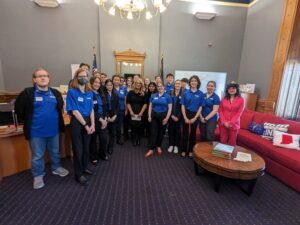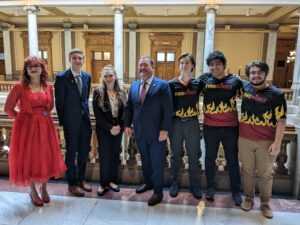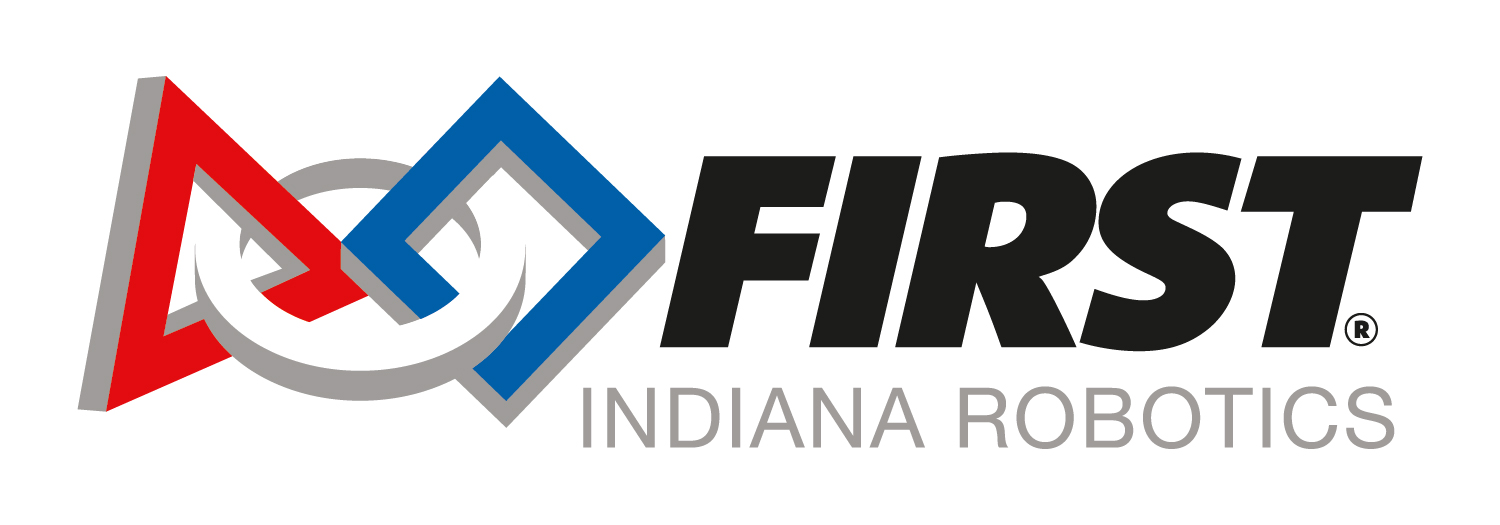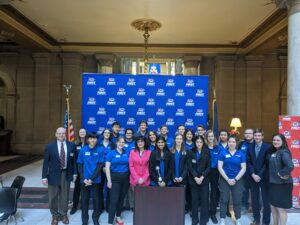Student Advocacy
Since 2015, FIRST Indiana Robotics has been the direct provider of FIRST in Indiana. During that time, we have developed a series of tools to engage the voice of the youth in our community.
Starting with student surveys to track the impact of the program and gathering data on where our students are going after participating in FIRST, these surveys have been invaluable data to help us craft training for mentors and to show impact for our sponsors. These surveys, while good data tools, weren’t providing enough opportunity for our youth to have a voice in FIRST Indiana Robotics.
In 2017, FIN introduced the Student Board of Directors. The formation of this youth board was inspired by Career and Technical Student Organizations around the United States, such as DECA, FFA, Skills USA, and TSA, etc., that have student boards or youth advisory councils.
Over the last six years, FIRST Indiana Robotics has worked to grow and evolve the student board into a student-led organization. Rising 10th, 11th, and 12th-grade students from FIRST Tech Challenge or
FIRST Robotics Competition may apply for the student board. The FIN Board of Directors conducts interviews and recommends membership and leadership positions within the board.
Our student board of directors has become crucial to our board of directors and ambassadors at our events. They have led our efforts to pass legislation in Indiana to support the growth of elementary, middle, and high school robotics.
The student board of directors meets with students at our competitions to get feedback from our participants and report back to the board of directors about the youth experience. They help us provide other opportunities at our competitions for students to be engaged in ways they would find interesting. Creating scavenger hunts, running roundtable discussions, and visiting teams to encourage students to apply for the next student board are examples of how the youth voice plays a vital role in our community.
According to the Annie E Casey Foundation, recommendations for youth advocacy are:
Foster safe and welcoming environments where young people feel comfortable discussing their experiences with staff and each other.
Provide youth with opportunities to strengthen their public-speaking skills.
Redefine advocacy and help young people see that they can do it in their daily lives.
 Our student board has participated in advocacy training, visited Congress members, and worked with the Governor and Secretary of Education over the last two years to advocate for legislation to expand robotics programs in Indiana’s schools.
Our student board has participated in advocacy training, visited Congress members, and worked with the Governor and Secretary of Education over the last two years to advocate for legislation to expand robotics programs in Indiana’s schools.
Another example of student advocacy we see in Indiana is through our teams. Because FIRST is “More than Robots,” and we award teams for their work outside building robots, we have had students on teams become heavily involved in advocacy.
One team in particular, FIRST Tech Challenge Team 12014 Fire Wires from Granger, IN, has led statewide advocacy efforts for our bill to expand robotics. They reached out to their state representative and state senator in 2020 to begin talks about how to start a bill. That led to partnering with FIRST Indiana Robotics and our student board to expand the reach to other statehouse members. Their early work led to the creation of a bill to expand robotics opportunities for all Hoosier children that is currently being heard in the Indiana General Assembly.
FIRST has designed a competition that awards students and teams for solving problems. STEM, at its core, is problem-solving. Whether those problems are related to building a robot or inspiring the next generation of young people to become leaders in STEM, FIRST recognizes all types of problem-solving.
“FIRST has helped me find one of my greatest passions, helping others.” – FIRST Participant Penn High School
Students in FIRST have long advocated Congress for several reasons. Increasing funding for Title IV Part A, amongst other things, provides schools with money to support STEM initiatives like robotics. They have also been instrumental in working with Congress to advocate for the Perkins Act, which funds Career and Technical Education.
These opportunities for youth to advocate for matters which concern them and to be actively involved in civil discourse and the legislative process is yet another way that FIRST prepares our participants for their future. The skills learned in advocating for these issues can translate to our youth being better prepared to advocate for themselves in the workplace and for others who can’t speak for themselves.

